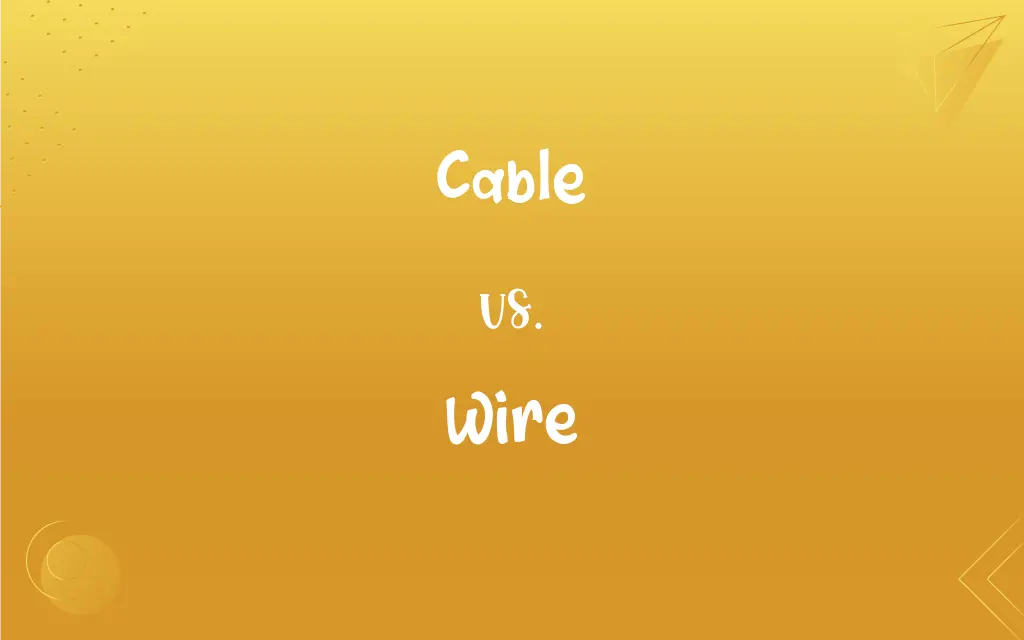Cable vs. Wire: What's the Difference?
Edited by Aimie Carlson || By Janet White || Published on December 31, 2023
A cable is a thick, strong rope made of wires twisted together, used for electrical transmission or to bear mechanical loads, while a wire is a single conductor, usually made of metal, used to carry electricity or a signal.

Key Differences
Cables are typically composed of multiple wires bundled or twisted together, often insulated, designed for strength and transmission of larger currents. Wires, on the other hand, are single, slender strands or rods of metal, often used where flexibility and ease of installation are important.
Cables are commonly used in electrical power transmission, telecommunications, and for bearing mechanical loads, requiring robustness and durability. Wires are more frequently used in smaller-scale electrical and electronic applications, such as in circuitry, where precision and flexibility are key.
Cables, due to their multiple-wire composition, often provide greater strength and durability but may be less flexible than single wires. Wires offer high flexibility and are ideal for applications requiring intricate bending and shaping.
In telecommunications, cables, such as coaxial or fiber-optic, are designed for efficient and high-capacity signal transmission. Wires, while also used for signal transmission, are more common in simpler, low-capacity applications.
Cables usually have multiple layers of insulation and protective sheathing, safeguarding against environmental factors and interference. Wires may have minimal insulation, relying on their simplicity and ease of integration into various devices.
ADVERTISEMENT
Comparison Chart
Composition
Multiple wires twisted together
Single slender strand or rod of metal
Primary Use
Power transmission, telecommunications
Electrical and electronic circuitry
Strength and Durability
Generally more robust and durable
Less robust, more delicate
Flexibility
Less flexible, more strength
Highly flexible
Insulation
Multiple layers, including sheathing
Minimal, often just a thin coating
ADVERTISEMENT
Cable and Wire Definitions
Cable
A strong rope, especially of metal, used to lift heavy objects.
They used a steel cable to hoist the heavy machinery.
Wire
A flexible medium used in sculptures and jewelry.
She crafted a beautiful sculpture out of copper wire.
Cable
A medium for transmitting information from one network device to another.
The internet technician is laying a new fiber-optic cable.
Wire
A metal filament used to conduct electricity.
The electrician replaced the damaged wire in the circuit.
Cable
A thick rope on a ship.
The anchor was secured by a sturdy cable.
Wire
A barrier made of wires, often used for enclosing areas.
They installed a barbed wire fence around the property.
Cable
A rope or wire used in bridges and elevators for support.
The suspension bridge is held up by massive cables.
Wire
A hidden electronic device for transmitting conversations.
The undercover agent was wearing a wire during the meeting.
Cable
A conductor for transmitting electrical power.
The underground cable carries electricity to the entire neighborhood.
Wire
A system for transmitting messages.
News was sent across the country via telegraph wire.
Cable
A strong, large-diameter, heavy steel or fiber rope.
Wire
Metal that has been drawn out into a strand or rod, used chiefly for structural support, as in concrete, and for conducting electricity, when it is usually insulated with a rubber or plastic cladding
Bought some wire at the hardware store.
Cable
Something that resembles such steel or fiber rope.
Wire
A strand or rod of such material, or a cable made of such strands twisted together.
Cable
(Electricity) A bound or sheathed group of mutually insulated conductors.
Wire
Fencing made of wire, especially barbed wire.
FAQs
What is a wire?
A wire is a single, usually metal, conductor used for carrying electricity or a signal.
Can cables be used for data transmission?
Yes, certain types of cables, like fiber-optic cables, are specifically designed for data transmission.
Is a cable stronger than a wire?
Generally, cables are stronger due to their composite structure of multiple wires.
What's the difference in flexibility between cable and wire?
Wires are usually more flexible than cables.
What is a cable?
A cable is a thick, strong rope made of wires twisted together, used for various purposes like electrical transmission or mechanical support.
Is cable or wire better for outdoor use?
Cables, due to their robust construction, are generally better suited for outdoor use.
Are cables used in computers?
Yes, various types of cables, like USB or Ethernet cables, are used in computer networking and connections.
Are wires always made of metal?
While most wires are metallic, some are made of other conductive materials like carbon or aluminum.
Can wires be insulated?
Yes, wires are often insulated to prevent electrical hazards and interference.
Are all cables flexible?
Not all; some are designed for rigidity and strength, like those used in bridges.
Are cables more expensive than wires?
This depends on the type and purpose, but cables are often more costly due to their complex structure.
Can wires be used underwater?
Specialized wires with waterproof insulation can be used underwater, but cables are more commonly used for underwater applications.
What type of cable is used for internet?
Coaxial or fiber-optic cables are commonly used for internet connections.
Can a wire be used for heavy lifting?
Generally, no; cables are preferred for heavy lifting due to their strength.
Is it safe to handle wires and cables?
Safety depends on their use and whether they are carrying current; handling live electrical wires or cables is hazardous.
Can a single wire transmit data?
Yes, but its capacity and efficiency are less compared to specialized cables.
Are cables and wires recyclable?
Many types are recyclable, especially those made of metals like copper and aluminum.
Can both cables and wires be used in electronic devices?
Yes, both are used, but wires are more common in small-scale and intricate electronic circuitry.
Are cables and wires affected by environmental factors?
Yes, but cables are generally more resistant due to their protective sheathing.
Can both be used in automotive applications?
Yes, both are used in automobiles for various electrical and mechanical purposes.
About Author
Written by
Janet WhiteJanet White has been an esteemed writer and blogger for Difference Wiki. Holding a Master's degree in Science and Medical Journalism from the prestigious Boston University, she has consistently demonstrated her expertise and passion for her field. When she's not immersed in her work, Janet relishes her time exercising, delving into a good book, and cherishing moments with friends and family.
Edited by
Aimie CarlsonAimie Carlson, holding a master's degree in English literature, is a fervent English language enthusiast. She lends her writing talents to Difference Wiki, a prominent website that specializes in comparisons, offering readers insightful analyses that both captivate and inform.






































































